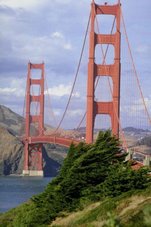NEWS ALERT
from The Wall Street Journal
March 7, 2008
U.S. recession fears mounted as employment fell in February at its fastest rate in five years, suggesting that the housing and credit crunch is gripping the broader economy. U.S. nonfarm payrolls fell by 63,000 in February, after declining 22,000 in January. If not for a rise in government jobs last month, payrolls would have fallen by more than 100,000. However, the unemployment rate dropped to 4.8% from 4.9%.
Ahead of the jobs report the Federal Reserve raised the amounts outstanding in its Term Auction Facility available to banks to $100 billion. The Fed's move lowered the odds of a change in the federal funds rate before the next meeting, but raised the chances of a three-quarter point reduction on March 18.
For more information,
For more analysis of the economy, see: http://blogs.wsj.com/economics
A reason to vote for McCain
Another indication of the affects of politics on business-I am seeing and hearing Investment Bankers and business owners starting to change deal structure and pricing in anticipation of a Democrat take over.
The general line is to lock in M&A terms now before Obama comes with his 28% Capital Gains rate, before the Bush tax cuts expire, before the death tax goes back to 55% over $1M valuation, etc. Lots of talk about shifting assets to trusts and getting creative in ways to avoid the hits.
Business owners are starting to look at ways to deal with increased regulation. Nobody has anything specific yet, but the general tone is that the increased regulation will be more in line with union rules and union organizing attempts. Things that stress business and create a favorful union organizing environment are expected.
Estimates that a full-tilt union America will drive up the cost of everything by 20%... That seems scary, but it was what I heard yesterday... Add to that the tax increases and credit crunch, plus whatever mischief Congress creates to replace the Alternative Minimum Tax... There are gonna be a lot of folks with six figure household income scrambling for tax shelters and new income opportunities...
The markets run ahead of events. Right now there is a bit of panic and a lot of fear. But the tide was already shifting in consideration of higher gasoline prices ($5-$6/gal-?), tighter credit, fewer home starts and less consumer spending...
The Democratic Congress and the Democratic Candidates have succeeded in scaring the marketplace-and the world... It's gonna take some strong medicine to prove them wrong... Cassandra is respected a lot longer than Pollyanna ever was...
Are we talking ourselves into a recession-?
George Anders column in Wednesday's WSJ reflects a lot of the thinking I am hearing and seeing...
Hurry, hurry, hurry to carry out corporate acquisitions before the November elections, some attorneys and investment bankers are telling their clients. That is because they think a Democratic presidential victory could create more roadblocks for takeovers.
Guessing what political-office seekers might do if elected is never a sure thing. Some stances taken on the campaign trail have a way of fading from sight once the election is over. Other positions prove impossible to implement.
Higher capital-gains taxes could also jolt the takeover market, though getting congressional approval for such changes won't be easy. In Senate votes in the past few years, both Sen. Obama and Sen. Clinton have voted for ending the current 15% capital-gains rate and returning to higher levels.
Mr. Obama told the TechCrunch Web site in November that he favored capital-gains tax rates close to 28%, where they were under the Reagan administration, though not quite that high. Mrs. Clinton hasn't been as specific.
For individual shareholders, a higher capital-gains rate would mean keeping less of the proceeds from selling a company. That could be a particular sore point for owners of closely held companies, who may have personally built up the value of such companies over decades. As a result, some private-equity firms are urging potential sellers of companies to act fast, while the 15% capital-gains rate still applies.


